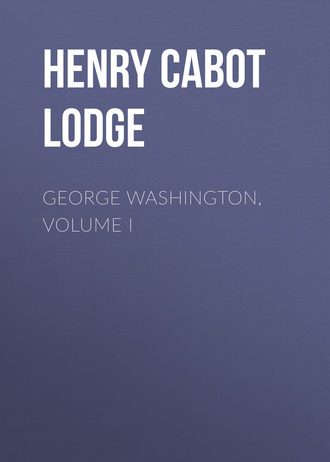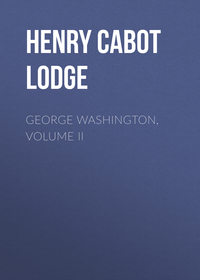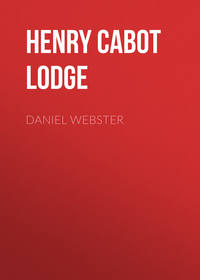 полная версия
полная версияGeorge Washington, Volume I
This defeat was complete and severe, and it was followed in a few days by that of Wayne, who narrowly escaped utter ruin. Yet through all this disaster we can see the advance which had been made since the equally unfortunate and very similar battle on Long Island. Then, the troops seemed to lose heart and courage, the army was held together with difficulty, and could do nothing but retreat. Now, in the few days which Howe, as usual, gave his opponent with such fatal effect to himself, Washington rallied his army, and finding them in excellent spirits marched down the Lancaster road to fight again. On the eve of battle a heavy storm came on, which so injured the arms and munitions that with bitter disappointment he was obliged to withdraw; but nevertheless it is plain how much this forward movement meant. At the moment, however, it looked badly enough, especially after the defeat of Wayne, for Howe pressed forward, took possession of Philadelphia, and encamped the main body of his army at Germantown.
Meantime Washington, who had not in the least given up his idea of fighting again, recruited his army, and having a little more than eight thousand men, determined to try another stroke at the British, while they were weakened by detachments. On the night of October 3 he started, and reached Germantown at daybreak on the 4th. At first the Americans swept everything before them, and flung the British back in rout and confusion. Then matters began to go wrong, as is always likely to happen when, as in this case, widely separated and yet accurately concerted action is essential to success. Some of the British threw themselves into a stone house, and instead of leaving them there under guard, the whole army stopped to besiege, and a precious half hour was lost. Then Greene and Stephen were late in coming up, having made a circuit, and although when they arrived all seemed to go well, the Americans were seized with an inexplicable panic, and fell back, as Wayne truly said, in the very moment of victory. One of those unlucky accidents, utterly unavoidable, but always dangerous to extensive combinations, had a principal effect on the result. The morning was very misty, and the fog, soon thickened by the smoke, caused confusion, random firing, and, worst of all, that uncertainty of feeling and action which something or nothing converted into a panic. Nevertheless, the Americans rallied quickly this time, and a good retreat was made, under the lead of Greene, until safety was reached. The action, while it lasted, had been very sharp, and the losses on both sides were severe, the Americans suffering most.
Washington, as usual when matters went ill, exposed himself recklessly, to the great alarm of his generals, but all in vain. He was deeply disappointed, and expressed himself so at first, for he saw that the men had unaccountably given way when they were on the edge of victory. The underlying cause was of course, as at Long Island and Brandywine, the unsteadiness of raw troops, and Washington felt rightly, after the first sting had passed, that he had really achieved a great deal. Congress applauded the attempt, and when the smoke of the battle had cleared away, men generally perceived that its having been fought at all was in reality the important fact. It made also a profound impression upon the French cabinet. Eagerly watching the course of events, they saw the significance of the fact that an army raised within a year could fight a battle in the open field, endure a severe defeat, and then take the offensive and make a bold and well-planned attack, which narrowly missed being overwhelmingly successful. To the observant and trained eyes of Europe, the defeat at Germantown made it evident that there was fighting material among these untrained colonists, capable of becoming formidable; and that there was besides a powerful will and directing mind, capable on its part of bringing this same material into the required shape and condition. To dispassionate onlookers, England's grasp on her colonies appeared to be slipping away very rapidly. Washington himself saw the meaning of it all plainly enough, for it was but the development of his theory of carrying on the war.
There is no indication, however, that England detected, in all that had gone on since her army landed at the Head of Elk, anything more than a couple of natural defeats for the rebels. General Howe was sufficiently impressed to draw in his troops, and keep very closely shut up in Philadelphia, but his country was not moved at all. The fact that it had taken forty-seven days to get their army from the Elk River to Philadelphia, and that in that time they had fought two successful battles and yet had left the American army still active and menacing, had no effect upon the British mind. The English were thoroughly satisfied that the colonists were cowards and were sure to be defeated, no matter what the actual facts might be. They regarded Washington as an upstart militia colonel, and they utterly failed to comprehend that they had to do with a great soldier, who was able to organize and lead an army, overcome incredible difficulties, beat and outgeneral them, bear defeat, and then fight again. They were unable to realize that the mere fact that such a man could be produced and such an army maintained meant the inevitable loss of colonies three thousand miles away. Men there were in England, undoubtedly, like Burke and Fox, who felt and understood the significance of these things, but the mass of the people, as well as the aristocracy, the king, and the cabinet, would have none of them. Rude contempt for other people is a warming and satisfying feeling, no doubt, and the English have had unquestionably great satisfaction from its free indulgence. No one should grudge it to them, least of all Americans. It is a comfort for which they have paid, so far as this country is concerned, by the loss of their North American colonies, and by a few other settlements with the United States at other and later times.
But although Washington and his army failed to impress England, events had happened in the north, during this same summer, which were so sharp-pointed that they not only impressed the English people keenly and unpleasantly, but they actually penetrated the dull comprehension of George III. and his cabinet. "Why," asked an English lady of an American naval officer, in the year of grace 1887—"why is your ship named the Saratoga?" "Because," was the reply, "at Saratoga an English general and an English army of more than five thousand men surrendered to an American army and laid down their arms." Although apparently neglected now in the general scheme of British education, Saratoga was a memorable event in the summer of 1777, and the part taken by Washington in bringing about the great result has never, it would seem, been properly set forth. There is no need to trace here the history of that campaign, but it is necessary to show how much was done by the commander-in-chief, five hundred miles away, to win the final victory.
In the winter of 1776-77 reports came that a general and an army were to be sent to Canada to invade the colonies from the north by way of Lake Champlain. The news does not seem to have made a very deep impression generally, nor to have been regarded as anything beyond the ordinary course of military events. But there was one man, fortunately, who in an instant perceived the full significance of this movement. Washington saw that the English had at last found an idea, or, at least, a general possessed of one. So long as the British confined themselves to fighting one or two battles, and then, taking possession of a single town, were content to sit down and pass their winter in good quarters, leaving the colonists in undisturbed control of all the rest of the country, there was nothing to be feared. The result of such campaigning as this could not be doubtful for a moment to any clear-sighted man. But when a plan was on foot, which, if successful, meant the control of the lakes and the Hudson, and of a line of communication from the north to the great colonial seaport, the case was very different. Such a campaign as this would cause the complete severance of New England, the chief source for men and supplies, from the rest of the colonies. It promised the mastery, not of a town, but of half a dozen States, and this to the American cause probably would be ruin.
So strongly and clearly did Washington feel all this that his counter-plan was at once ready, and before people had fairly grasped the idea that there was to be a northern invasion, he was sending, early in March, urgent letters to New England to rouse up the militia and have them in readiness to march at a moment's notice. To Schuyler, in command of the northern department, he began now to write constantly, and to unfold the methods which must be pursued in order to compass the defeat of the invaders. His object was to delay the army of Burgoyne by every possible device, while steadily avoiding a pitched battle. Then the militia and hardy farmers of New England and New York were to be rallied, and were to fall upon the flank and rear of the British, harass them constantly, cut off their outlying parties, and finally hem them in and destroy them. If the army and people of the North could only be left undisturbed, it is evident from his letters that Washington felt no doubt as to the result in that quarter.
But the North included only half the conditions essential to success. The grave danger feared by Washington was that Howe would understand the situation, and seeing his opportunity, would throw everything else aside, and marching northward with twenty thousand men, would make himself master of the Hudson, effect a junction with Burgoyne at Albany, and so cut the colonies in twain. From all he could learn, and from his knowledge of his opponents' character, Washington felt satisfied that Howe intended to capture Philadelphia, advancing, probably, through the Jerseys. Yet, despite his well-reasoned judgment on this point, it seemed so incredible that any soldier could fail to see that decisive victory lay in the north, and in a junction with Burgoyne, that Washington could not really and fully believe in such fatuity until he knew that Howe was actually landing at the Head of Elk. This is the reason for the anxiety displayed in the correspondence of that summer, for the changing and shifting movements, and for the obvious hesitation of opinion, so unusual with Washington at any time. Be it remembered, moreover, that it was an awful doubt which went to bed and got up and walked with him through all those long nights and days. If Howe, the dull and lethargic, should awake from his dream of conquering America by taking now and again an isolated town, and should break for the north with twenty thousand men, the fortunes of the young republic would come to their severest test.
In that event, Washington knew well enough what he meant to do. He would march his main army to the Hudson, unite with the strong body of troops which he kept there constantly, contest every inch of the country and the river with Howe, and keep him at all hazards from getting to Albany. But he also knew well that if this were done the odds would be fearfully against him, for Howe would then not only outnumber him very greatly, but there would be ample time for the British to act, and but a short distance to be covered. We can imagine, therefore, his profound sense of relief when he found that Howe and his army were really south of Philadelphia, after a waste of many precious weeks. He could now devote himself single-hearted to the defense of the city, for distance and time were at last on his side, and all that remained was to fight Howe so hard and steadily that neither in victory nor defeat would he remember Burgoyne. Pitt said that he would conquer Canada on the plains of Germany, and Burgoyne was compelled to surrender in large measure by the campaign of Washington in New Jersey and Pennsylvania.
If we study carefully Washington's correspondence during that eventful summer, grouping together that relating to the northern campaign, and comparing it with that which dealt with the affairs of his own army, all that has just been said comes out with entire clearness, and it is astonishing to see how exactly events justified his foresight. If he could only hold Howe in the south, he was quite willing to trust Burgoyne to the rising of the people and to the northern wilderness. Every effort he made was in this direction, beginning, as has been said, by his appeals to the New England governors in March. Schuyler, on his part, was thoroughly imbued with Washington's other leading idea, that the one way to victory was by retarding the enemy. At the outset everything went utterly and disastrously wrong. Washington counted on an obstinate struggle, and a long delay at Ticonderoga, for he had not been on the ground, and could not imagine that our officers would fortify everything but the one commanding point.
The loss of the forts appalled the country and disappointed Washington, but did not shake his nerve for an instant. He wrote to Schuyler: "This stroke is severe indeed, and has distressed us much. But notwithstanding things at present have a dark and gloomy aspect, I hope a spirited opposition will check the progress of General Burgoyne's army, and that the confidence derived from his success will hurry him into measures that will, in their consequences, be favorable to us. We should never despair; our situation has before been unpromising, and has changed for the better; so I trust it will again. If new difficulties arise we must only put forth new exertions, and proportion our efforts to the exigency of the times." Even after this seemingly crushing defeat he still felt sure of Burgoyne, so long as he was unsupported. Suiting the action to the word, he again bent every nerve to rouse New England and get out her militia. When he was satisfied that Howe was landing below Philadelphia, the first thing he did was to send forth the same cry in the same quarter, to bring out more men against Burgoyne. He showed, too, the utmost generosity toward the northern army, sending thither all the troops he could possibly spare, and even parting with his favorite corps of Morgan's riflemen. Despite his liberality, the commanders in the north were unreasonable in their demands, and when they asked too much, Washington flatly declined to send more men, for he would not weaken himself unduly, and he knew what they did not see, that the fate of the northern invasion turned largely on his own ability to cope with Howe.
The blame for the loss of the forts fell of course upon Schuyler, who was none too popular in Congress, and who with St. Clair was accordingly made a scape-goat. Congress voted that Washington should appoint a new commander, and the New England delegates visited him to urge the selection of Gates. This task Washington refused to perform, alleging as a reason that the northern department had always been considered a separate command, and that he had never done more than advise. These reasons do not look very weighty or very strong, and it is not quite clear what the underlying motive was. Washington never shrank from responsibility, and he knew very well that he could pick out the best man more unerringly than Congress. But he also saw that Congress favored Gates, whom he would not have chosen, and he therefore probably felt that it was more important to have some one whom New England believed in and approved than a better soldier who would have been unwelcome to her representatives. It is certain that he would not have acted thus, had he thought that generalship was an important element in the problem; but he relied on a popular uprising, and not on the commander, to defeat Burgoyne. He may have thought, too, that it was a mistake to relieve Schuyler, who was working in the directions which he had pointed out, and who, if not a great soldier, was a brave, high-minded, and sensible man, devoted to his chief and to the country. It was Schuyler indeed who, by his persistent labor in breaking down bridges, tearing up roads, and felling trees, while he gathered men industriously in all directions, did more than any one else at that moment to prepare the way for an ultimate victory.
Whatever his feelings may have been in regard to the command of the northern department, Washington made no change in his own course after Gates had been appointed. He knew that Gates was at least harmless, and not likely to block the natural course of events. He therefore felt free to press his own policy without cessation, and without apprehension. He took care that Lincoln and Arnold should be there to look after the New England militia, and he wrote to Governor Clinton, in whose energy and courage he had great confidence, to rouse up the men of New York. He suggested the points of attack, and at every moment advised and counseled and watched, holding all the while a firm grip on Howe. Slowly and surely the net, thus painfully set, tightened round Burgoyne. The New Englanders whipped one division at Bennington, and the New Yorkers shattered another at Oriskany and Fort Schuyler. The country people turned out in defense of their invaded homes and poured into the American camp. Burgoyne struggled and advanced, fought and retreated. Gates, stupid, lethargic, and good-natured, did nothing, but there was no need of generalship; and Arnold was there, turbulent and quarrelsome, but full of daring; and Morgan, too, equally ready; and they and others did all the necessary fighting.
Poor Burgoyne, a brave gentleman, if not a great general, had the misfortune to be a clever man in the service of a stupid administration, and he met the fate usually meted out under such circumstances to men of ideas. Howe went off to the conquest of Philadelphia, Clinton made a brief burning and plundering raid up the river, and the northern invasion, which really had meaning, was left to its fate. It was a hard fate, but there was no escape. Outnumbered, beaten, and caught, Burgoyne surrendered. If there had been a fighting-man at the head of the American army, the British would have surrendered as prisoners of war, and not on conditions. Schuyler, we may be sure, whatever his failings, would never have let them off so easily. But it was sufficient as it was. The wilderness, and the militia of New York and New England swarming to the defense of their homes, had done the work. It all fell out just as Washington had foreseen and planned, and England, despising her enemy and their commander, saw one of her armies surrender, and might have known, if she had had the wit, that the colonies were now lost forever. The Revolution had been saved at Trenton; it was established at Saratoga. In the one case it was the direct, in the other the indirect, work of Washington.
Poor Gates, with his dull brain turning under the impression that this crowning mercy had been his own doing, lost his head, forgot that there was a commander-in-chief, and sending his news to Congress, left Washington to find out from chance rumors, and a tardy letter from Putnam, that Burgoyne had actually surrendered. This gross slight, however, had deeper roots than the mere exultation of victory acting on a heavy and common mind. It represented a hostile feeling which had been slowly increasing for some time, which had been carefully nurtured by those interested in its growth, and which blossomed rapidly in the heated air of military triumph. From the outset it had been Washington's business to fight the enemy, manage the army, deal with Congress, and consider in all its bearings the political situation at home and abroad; but he was now called upon to meet a trouble outside the line of duty, and to face attacks from within, which, ideally speaking, ought never to have existed, but which, in view of our very fallible humanity, were certain to come sooner or later. Much domestic malice Washington was destined to encounter in the later years of political strife, but this was the only instance in his military career where enmity came to overt action and open speech. The first and the last of its kind, this assault upon him has much interest, for a strong light is thrown upon his character by studying him, thus beset, and by seeing just how he passed through this most trying and disagreeable of ordeals.
The germ of the difficulties was to be found where we should expect it, in the differences between the men of speech and the man of action, between the lawmakers and the soldier. Washington had been obliged to tell Congress a great many plain and unpleasant truths. It was part of his duty, and he did it accordingly. He was always dignified, calm, and courteous, but he had an alarmingly direct way with him, especially when he was annoyed. He was simple almost to bluntness, but now and then would use a grave irony which must have made listening ears tingle. Congress was patriotic and well-intentioned, and on the whole stood bravely by its general, but it was unversed in war, very impatient, and at times wildly impracticable. Here is a letter which depicts the situation, and the relation between the general and his rulers, with great clearness. March 14, 1777, Washington wrote to the President: "Could I accomplish the important objects so eagerly wished by Congress,—'confining the enemy within their present quarters, preventing their getting supplies from the country, and totally subduing them before they are reinforced,'—I should be happy indeed. But what prospect or hope can there be of my effecting so desirable a work at this time?"
We can imagine how exasperating such requests and suggestions must have been. It was very much as if Congress had said: "Good General, bring in the Atlantic tides and drown the enemy; or pluck the moon from the sky and give it to us, as a mark of your loyalty." Such requests are not soothing to any man struggling his best with great anxieties, and with a host of petty cares. Washington, nevertheless, kept his temper, and replied only by setting down a few hard facts which answered the demands of Congress in a final manner, and with all the sting of truth. Thus a little irritation had been generated in Congress against the general, and there were some members who developed a good deal of pronounced hostility. Sam Adams, a born agitator and a trained politician, unequaled almost in our history as an organizer and manager of men, able, narrow, coldly fierce, the man of the town meeting and the caucus, had no possibility of intellectual sympathy with the silent, patient, hard-gripping soldier, hemmed with difficulties, but ever moving straight forward to his object, with occasional wild gusts of reckless fighting passion. John Adams, too, brilliant of speech and pen, ardent, patriotic, and high-minded, was, in his way, out of touch with Washington. Although he moved Washington's appointment, he began almost immediately to find fault with him, an exercise to which he was extremely prone. Inasmuch as he could see how things ought to be done, he could not understand why they were not done in that way at once, for he had a fine forgetfulness of other people's difficulties, as is the case with most of us. The New England representatives generally took their cue from these two, especially James Lovell, who carried his ideas into action, and obtained a little niche in the temple of fame by making himself disagreeably conspicuous in the intrigue against the commander-in-chief, when it finally developed.
There were others, too, outside New England who were discontented, and among them Richard Henry Lee, from the General's own State. He was evidently critical and somewhat unfriendly at this time, although the reasons for his being so are not now very distinct. Then there was Mr. Clark of New Jersey, an excellent man, who thought the General was invading popular rights; and to him others might be added who vaguely felt that things ought to be better than they were. This party, adverse to Washington, obtained the appointment of Gates to the northern department, under whom the army won a great victory, and they were correspondingly happy. John Adams wrote his wife that one cause of thanksgiving was that the tide had not been turned by the commander-in-chief and southern troops, for the adulation would have been intolerable; and that a man may be wise and virtuous and not a deity.
Here, so far as the leading and influential men were concerned, the matter would have dropped, probably; but there were lesser men like Lovell who were much encouraged by the surrender of Burgoyne, and who thought that they now might supplant Washington with Gates. Before long, too, they found in the army itself some active and not over-scrupulous allies. The most conspicuous figure among the military malcontents was Gates himself, who, although sluggish in all things, still had a keen eye for his own advancement. He showed plainly how much his head had been turned by the victory at Saratoga when he failed to inform Washington of the fact, and when he afterward delayed sending back troops until he was driven to it by the determined energy of Hamilton, who was sent to bring him to reason. Next in importance to Gates was Thomas Mifflin, an ardent patriot, but a rather light-headed person, who espoused the opposition to Washington for causes now somewhat misty, but among which personal vanity played no inconsiderable part. About these two leaders gathered a certain number of inferior officers of no great moment then or since.





